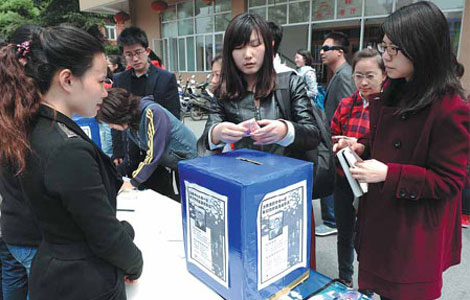ASEAN friendship growing
Updated: 2013-05-07 08:12
By Chu Hao (China Daily)
|
|||||||||||
First official overseas trip by China's new foreign minister highlights promoting regional relations is diplomatic focus
Chinese Foreign Minister Wang Yi paid official visits to Thailand, Indonesia, Singapore and Brunei from Tuesday to Sunday and had friendly talks with leaders and officials of the host nations. As his first official trip since taking office, it shows China's diplomatic focus has shifted to its surrounding environment and China's new leadership has made regional diplomacy a priority.
In a globalized world, China cannot enjoy prosperity without a peaceful and stable external environment, of which the surrounding environment is a fundamental part. Wang's trip sent the important signal that China's new leadership attaches great importance to relations with neighboring countries and has prioritized neighboring countries in the nation's diplomacy.
As a growing power, China's development space and immediate arena are still the surrounding region, and promoting friendships and partnerships with neighboring countries should be the focus of China's diplomacy in the future. Improving relations with the great powers has been given too much attention up to now.
In China's diplomacy with its neighbors, relations with the Association of Southeast Asian Nations are a priority. In July 1991, former foreign minister Qian Qichen attended the 24th ASEAN Foreign Ministers Meeting in Kuala Lumpur, Malaysia, which marked the beginning of the dialogue process. Since then, China-ASEAN cooperation has advanced swiftly and a strategic partnership for peace and prosperity has been established, becoming a model for South-South cooperation.
During his trip, Wang said China will continue to encourage ASEAN to develop and play a leading role in regional cooperation, firmly supporting ASEAN in its integration process and the building of the ASEAN Community. He said the two should make joint efforts to map out the blueprint of friendly cooperation for the next decade, as this year marks the 10th anniversary of the establishment of strategic partnership between China and ASEAN and is a new historic starting point for the relations between the two sides. This highlighted the rising status of ASEAN in China's diplomatic strategy.
In the political and diplomatic field, strategic cooperation became a new area of cooperation between China and ASEAN member countries. Indonesia is the largest country within ASEAN and its relations with China are crucial to the region's stability and development. As strategic partners, the two countries have carried out comprehensive, multi-dimensional and mutually beneficial cooperation. China and Indonesia still have much room and potential to develop their relations, and strengthening the bilateral strategic partnership will have a significant and positive impact on promoting the development of a multipolar world and improving the international political and economic order.
China and Thailand have agreed to forge closer bilateral relations and transform the sound political ties between the two countries into a strong driving force for greater mutually beneficial cooperation. They will continue to implement the action plan on China-Thailand strategic cooperation and other programmatic documents and make plans for the future development of bilateral ties.
China and Singapore will upgrade their bilateral relationship and strengthen political mutual trust.
During his trip, Wang stressed the combination of China's development and the four countries' respective development strategies. He suggested expanding bilateral trade and investment, deepening mutually beneficial cooperation in such fields as water management, railways, new energy and education with Thailand; expanding trade and mutual investment with Indonesia; strengthening cooperation in new areas such as finance, ecology, science and technology and social management with Singapore; and carrying out cooperation in the fields of energy, infrastructure, agriculture, fisheries, healthcare and tourism with Brunei.
All these reflect the sincere willingness of China's new leaders to deepen bilateral economic and trade cooperation with Southeast Asian countries.
In security, China and the four countries have agreed to properly handle differences and disputes between the countries concerned through friendly consultation and mutually beneficial cooperation, expanding common ground and removing disturbances, to discuss and steadily promote the Code of Conduct in the South China Sea procedure in the process of implementing effectively the Declaration on the Conduct of Parties in the South China Sea in an all-round way.
To this end, both sides will continue to hold high-profile meetings on the implementation of the Declaration and to discuss promoting the Code of Conduct procedure under the framework of the joint working group on implementation of the Declaration.
Overall, Wang's first overseas tour to Southeast Asia has been fruitful, setting a clear direction and roadmap for future bilateral mutually beneficial cooperation on the basis of consolidating pragmatic cooperation with the four ASEAN member states. The trip has demonstrated that good-neighborly friendship, mutually beneficial cooperation and common development are the trends for relations between China and ASEAN, and the two sides are fully capable of safeguarding regional peace and stability, including in the South China Sea.
The author is a research scholar at the Institute of South and Southeast Asian and Oceanian Studies, under China Institutes of Contemporary International Relations.
Related readings:
FM wraps up tour on note of stability
China and Brunei Darussalam issue joint press release
Today's Top News
China-India border area standoff eases
President Xi Jinping calls for Middle East talks
Fishing fleet sets sail for Nansha Islands
Police step up fight against jaywalkers
Reduced red tape to boost economy
34 detained for attack on police, govt workers
Pesticide detectors not always accurate
Nongfu Spring to sue over claims
Hot Topics
Lunar probe , China growth forecasts, Emission rules get tougher, China seen through 'colored lens', International board,
Editor's Picks

|

|

|

|

|

|





